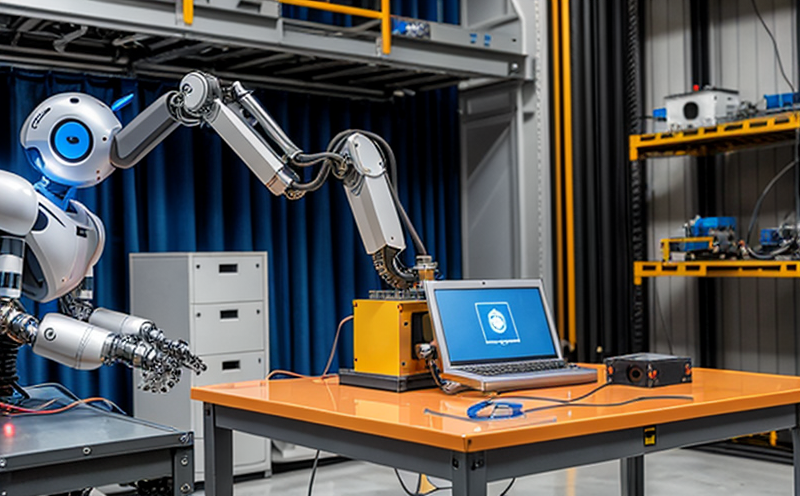Robotic Hardware Safety & Compliance Testing
The demand for robotics and artificial intelligence (AI) systems in various sectors continues to grow. With this growth comes the need for rigorous testing to ensure that these systems meet safety standards, comply with relevant regulations, and perform reliably under diverse conditions. Robotic hardware safety and compliance testing is a critical phase in the development lifecycle of robotic systems. This type of testing ensures that all components are safe and reliable when used as intended.
Robotic systems can be found across numerous industries including healthcare, manufacturing, agriculture, logistics, and more. Each sector poses unique challenges regarding safety standards due to differing working environments and operational requirements. For instance, robots in a hospital setting must adhere to stringent hygiene protocols while those in an industrial environment might need to withstand harsher conditions.
Compliance testing involves evaluating whether the hardware conforms to applicable regulations such as ISO 13482 for medical devices or IEC 60256-12 for industrial robots. Compliance ensures that manufacturers meet legal requirements and can sell their products globally without facing regulatory hurdles. Meanwhile, safety testing focuses on identifying potential hazards within the system itself, its components, and interactions with other systems or personnel.
At Eurolab, our expertise lies in providing comprehensive robotic hardware safety & compliance testing services tailored to your specific needs. Our state-of-the-art facilities employ advanced technologies that simulate real-world scenarios where robots operate. This allows us to assess not only the mechanical integrity but also electrical characteristics, software functionality, and overall performance.
Our team of experienced engineers uses international standards like ISO 13482:2017 for medical robots or IEC 60256-12:2019 for industrial robots as benchmarks during testing. These standards provide guidelines on how to design, manufacture, and test robotic systems safely and effectively.
Testing begins with thorough inspection and characterization of the robot's hardware components including motors, sensors, controllers, etc. Next comes functional verification where we check if all parts work together seamlessly under controlled conditions. Afterward comes robustness testing which exposes the system to various stressors such as vibrations or temperature variations to ensure long-term reliability.
Once the initial tests have been completed successfully, more stringent evaluations follow focusing on specific aspects like cybersecurity measures against unauthorized access or interference from external sources. Lastly, human factors studies are conducted to understand how operators interact with the machine and its surroundings ensuring maximum comfort and efficiency during operation.
Scope and Methodology
| Test Parameter | Description |
|---|---|
| Electrical Safety | Evaluates the electrical integrity of the robot ensuring no risks associated with shocks or fires. |
| Mechanical Strength | Determines how well the mechanical components can withstand physical stresses without failing. |
| Software Stability | Achieved through extensive code reviews and simulations to ensure flawless execution under all circumstances. |
| Cybersecurity | Ensures that the robot cannot be hacked or manipulated by unauthorized parties. |
| Human Factors | Studies how operators interact with the machine, focusing on ease of use and safety considerations. |
| Environmental Conditions | Evaluates performance in different environments ranging from clean rooms to outdoor settings. |
The scope encompasses all these parameters ensuring a holistic evaluation of the robotic hardware. The methodology involves systematic approaches for each test parameter, combining theoretical analysis with practical experimentation. Our team works closely with clients throughout this process providing feedback whenever necessary.
Eurolab Advantages
At Eurolab, we understand that successful robotic hardware safety and compliance testing is not just about following procedures; it's also about understanding your business goals. Here are some key advantages of partnering with us:
- Comprehensive Services: We offer a full range of services from initial design consultation to final product certification.
- International Expertise: Our team comprises experts from around the world who stay updated on latest developments in robotics and AI.
- Custom Solutions: Every project receives tailored solutions based on unique requirements ensuring best results.
- State-of-the-Art Facilities: Equipped with cutting-edge technology, our labs provide realistic simulation environments for testing purposes.
- Regulatory Compliance: Our services are aligned with international standards guaranteeing global market entry.
- Cost Efficiency: By identifying issues early on in the development cycle, we help reduce costs associated with rework or recalls later down the line.
- Prompt Delivery: With efficient project management practices, we ensure timely completion of all tasks without compromising quality.
Partnering with Eurolab means working alongside professionals committed to delivering excellence in every aspect of robotic hardware safety and compliance testing.
Use Cases and Application Examples
In healthcare, robotic assistants are used for surgeries requiring precision beyond human capabilities. These systems must adhere strictly to medical device regulations like ISO 13482:2017 ensuring sterility throughout the procedure. Compliance testing verifies that these robots meet these stringent requirements.
Manufacturing plants employ industrial robots capable of performing repetitive tasks faster than humans without risk of injury. IEC 60256-12:2019 sets out guidelines for safe operation in such environments. Robotic hardware safety and compliance testing ensures that these machines operate safely even under heavy loads or extreme temperatures.
Logistics companies utilize autonomous vehicles to transport goods across vast distances efficiently. Testing focuses on ensuring that these systems comply with road traffic regulations while maintaining high levels of accuracy in navigation and decision-making processes.
Agriculture benefits from robotic technology too, especially for tasks like crop spraying or harvesting crops. Compliance testing here ensures that the robot does not harm plants or nearby structures during operation.
These examples illustrate just a few ways Eurolab's expertise can benefit different industries by ensuring safe and reliable robotic hardware solutions.





